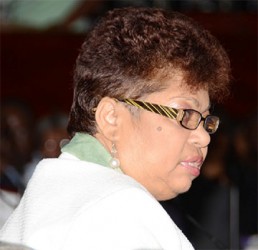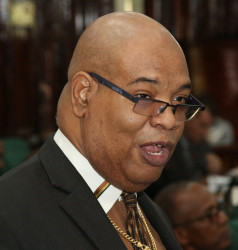The passage of this year’s national budget would enable the Social Cohesion Ministry to lay the foundation for building and sustaining a momentum that would foster longer term social programming, Minister Amna Ally declared on Thursday.
In her contribution to the budget debate in the National Assembly, Ally also urged members to work together to heal fractured relationships and stamp out mistrust in a quest to achieve cohesion.
“Ladies and gentlemen, our diversities as well as experiences of our colonial past have caused some fractures in relations and mistrust among us… we cannot continue in disunity, disharmony and division. We will work towards cohesion,” she said.

Ally described the proposed $230 billion budget as being “geared to include all Guyanese,” while adding that it sets out to create scope for citizens to be included in development. Ally added that her ministry—which has continued to attract questions over its reason for being—speaks directly to a role of fostering a peaceful and inclusive society.
However, on the previous day, PPP/C MP Juan Edghill said when it comes to national unity, there must be more than talk and sentimental thinking. He said if the government is serious it will put it on paper and bring it before the House for discussion. “Don’t let it just be talk and hot air,” he declared.
Ally told the House that the budget will support initiatives of the ministry to develop policy, programmatic and operational frameworks as well as initiate strategic actions. These actions, she added, include capacity building and development of strategic partnerships for pursuing a social cohesion agenda.
The budgetary allocations, she said, will allow the ministry to work with communities across Guyana and give citizens an opportunity to cooperate with each other.

She said the ministry’s agenda includes meetings and consultations with communities across Guyana, convening additional sensitisation and networking meetings with strategic stakeholder groups and information sharing and coordinating meetings with stakeholders.
She gave her ministry’s commitment to undertaking training and capacity building for social cohesion programming and management and mediation, conflict resolution and peace building initiatives.
According to Ally, the allocation would also assist the ministry to achieve the objective of formulating and implementing a strategic framework for more effective advocacy, strategic communications and outreach programmes on social cohesion and allow for the preparation and dissemination of advocacy and strategic communications products, such as brochures, posters, and fact sheets on social cohesion and related issues.
In addition to fostering cohesion, she revealed that the ministry has partnered with the Institute of Applied Sciences and Technology in a soap making project in the North Rupununi and multiple use of peanuts in Aranaputa and Parishara.
She said too that the ministry has also been in the forefront in providing support for every child to attend school regularly and punctually through President David Granger’s ‘3Bs’ initiative. Under the programme, which is administered by Ally’s ministry, buses, boats and bicycles are distributed to ensure children attend school.
Ally further said that the ministry had done a lot of work in eight months. “Let me say this is just the tip of the iceberg,” she added.
Who decides?
Edghill on Wednesday criticised the ‘3Bs’ initiative, while stating that it lacks transparency since the process used to select beneficiary children and communities is unknown.
“We need to ask the question: Who decides who get bicycles… buses… boats? Which communities?” he questioned during his contribution to the debate on Thursday.
“So when a political investor donates 50 bicycles and somebody go to a community to distribute, there is 700 or 800 in that school that is left without a bicycle,” he said, before adding that when the PPP/C distributed goods and services every child would benefit. He told the House that every child in the public school benefited from the $10,000 education cash grant that was instituted under the PPP/C. “There is nothing more discriminatory as the boats, buses and bicycles administered by the Ministry of Social Cohesion,” he declared.





